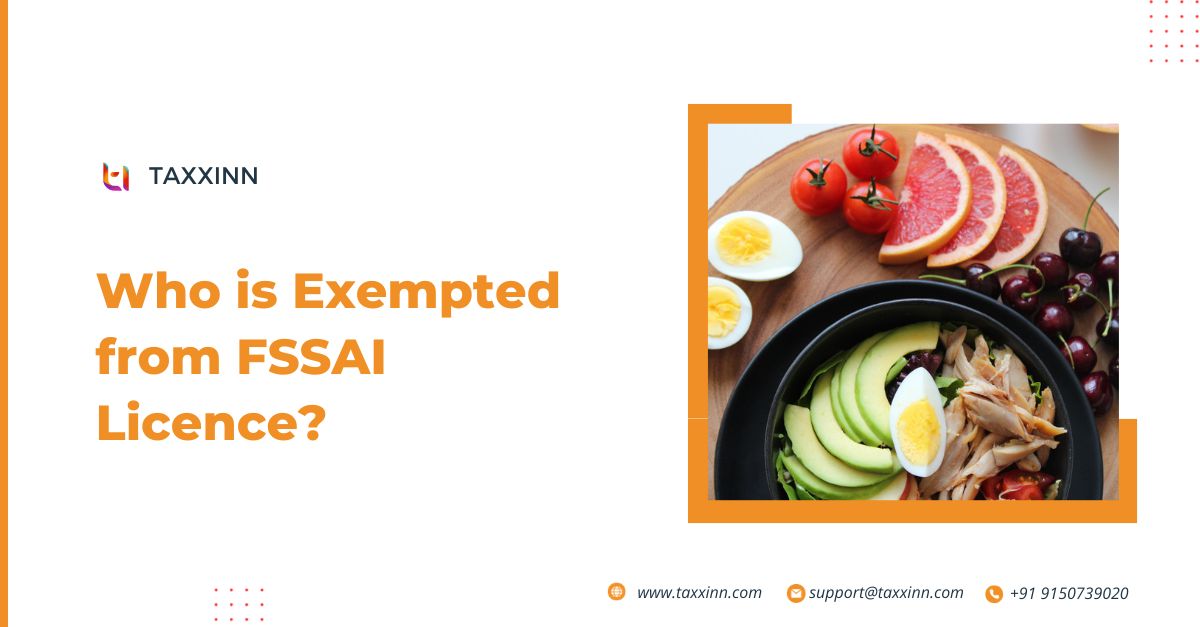For all food-related enterprises, food safety is vital. Food safety regulations might be difficult for small enterprises to comply with. They might be helpful by applying for an FSSAI licence from the Indian food safety authorities. India’s food business is highly regulated and for a valid reason. For the sake of the general public’s health and to stop foodborne infections, food safety must be guaranteed.
Although specifically exempted by the law, obtaining an FSSAI licence is mandatory for all businesses involved in the food industry, sometimes referred to as “food business operators” or “FBOs.” We are going to explore the FSSAI exemption list in this blog.
What is FSSAI?
The Food Safety and Standards Authority of India (FSSAI) is the organisation’s full-form name. Associated with the Indian Government’s Ministry of Health and Family Welfare is the organisation. It seeks to develop scientific standards for the control, inspection, and regulation of the production, storage, selling, distribution, and import of foods with the objective to guarantee that healthy and rich nutrients are available to humans.
India’s Small-Scale Food Businesses Require an FSSAI Licence
India’s small-scale food enterprises can gain a lot from obtaining an FSSAI licence. They may gain the trust of their customers, adhere to food safety rules, and enter fresh markets by doing this. Additionally, it improves their business procedures and defends them from problems with food safety. Also, an FSSAI licence can make a business stand out. It also gets access to valuable resources and training. Consider that maintaining compliance is necessary in order to obtain an FSSAI licence. However, doing so has advantages that could make small food enterprises wealthy in the future. Even though FSSAI is necessary there are few who are exempted from FSSAI licence.
Who is exempted from the FSSAI licence?
- According to order 03-01/2012/Enf-I/FSSAI issued by the FSSAI on January 21st, 2015, the following organisations were exempted from having to register with the FSSAI if an individual person was producing or executing food business activities from their homes:
- a Cooperative Society with legal status
- Mahila Udyog
- Gruh Udyog
- Self Help Group
- Any comparable government-registered organisation
- A direct seller isn’t obliged to obtain an FSSAI registration certificate unless the direct selling organisation voluntarily assumes this responsibility and explicitly authorises them to do so. In all other cases, direct sellers are mandated to apply for an FSSAI licence.
- If a milkman or vendor sells all their milk to a cooperative organisation and becomes a registered vendor of that society, they are exempted from acquiring FSSAI registration. In this scenario, it is the Cooperative Society’s responsibility to possess an FSSAI licence or be registered with the FSSAI.
- The following food enterprises are exempt from obtaining registration in accordance with FSSAI letter 15(6) and documents dated July 8 and September 19, 2019, by the FLRS/RCD/FSSAI
- last-mile delivery person
- Food vending machines with direct-selling agents
- vending machines for water
- ATMs for food (owned by one company)
- Food cart proprietors
In accordance with Section 3(n) of the FSS Act, 2006, cutlery and packaging materials used for serving or packing food do not fall under the definition of ‘food.’ Therefore, they are not subject to the requirement for an FSSAI licence or registration.
Advantages of Obtaining FSSAI Registration
1. Legal Compliance: Holding an FSSAI licence ensures that a food business operates within the bounds of the law, adhering to all relevant regulations and government food safety standards.
2. Goodwill and Trust: FSSAI registration acts as a confirmation that food products meet essential quality and safety requirements, instilling confidence and trust in consumers.
3. Food Safety Assurance: The presence of the FSSAI logo on food products assures consumers that the items have undergone rigorous quality assessments and are safe for consumption.
4. Consumer Awareness: Displaying the FSSAI registration number at food establishments not only raises consumer awareness but also builds trust in the company’s cleanliness and safety practices.
5. Business Growth: FSSAI certification is often a prerequisite for expanding the food industry, whether through opening new branches or securing contracts with institutional customers.
6. Access to Funds: Having an FSSAI licence can facilitate the process of obtaining financing from investors, as it serves as evidence of meeting legal requirements.
Obtaining an FSSAI license ensures not only legal compliance but also enhances the food industry’s credibility and reputation, fostering consumer confidence and creating new avenues for business growth.
Conclusion
All food business operators or companies involved in activities such as buying, selling, exporting, distributing, and more, concerning food products, must obtain an FSSAI Licence as a legal obligation. This article covers the organizations listed in the FSSAI exemption list, specifying those exempt from the FSSAI Registration requirement. At Taxxinn, we specialize in facilitating the hassle-free acquisition of your FSSAI licence.
Related Reads,
Food Labelling Business Registration in India.


